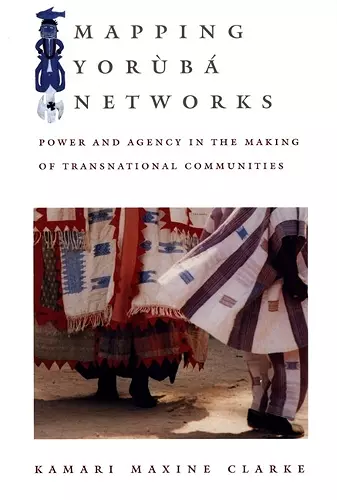Mapping Yorùbá Networks
Power and Agency in the Making of Transnational Communities
Format:Paperback
Publisher:Duke University Press
Published:12th Jul '04
Currently unavailable, and unfortunately no date known when it will be back

Ethnographic study of life and ritual in an African American Yoruba revivalist community and its complex relation to Nigerian Yoruba identity
Three flags fly in the palace courtyard of Òyótúnjí African Village. One represents black American emancipation from slavery, one black nationalism, and the third the establishment of an ancient Yorùbá Empire in the state of South Carolina. Located sixty-five miles southwest of Charleston, Òyótúnjí is a Yorùbá revivalist community founded in 1970. Mapping Yorùbá Networks is an innovative ethnography of Òyótúnjí and a theoretically sophisticated exploration of how Yorùbá òrìsà voodoo religious practices are reworked as expressions of transnational racial politics. Drawing on several years of multisited fieldwork in the United States and Nigeria, Kamari Maxine Clarke describes Òyótúnjí in vivid detail—the physical space, government, rituals, language, and marriage and kinship practices—and explores how ideas of what constitutes the Yorùbá past are constructed. She highlights the connections between contemporary Yorùbá transatlantic religious networks and the post-1970s institutionalization of roots heritage in American social life.
Examining how the development of a deterritorialized network of black cultural nationalists became aligned with a lucrative late-twentieth-century roots heritage market, Clarke explores the dynamics of Òyótúnjí Village’s religious and tourist economy. She discusses how the community generates income through the sale of prophetic divinatory consultations, African market souvenirs—such as cloth, books, candles, and carvings—and fees for community-based tours and dining services. Clarke accompanied Òyótúnjí villagers to Nigeria, and she describes how these heritage travelers often returned home feeling that despite the separation of their ancestors from Africa as a result of transatlantic slavery, they—more than the Nigerian Yorùbá—are the true claimants to the ancestral history of the Great Òyó Empire of the Yorùbá people. Mapping Yorùbá Networks is a unique look at the political economy of homeland identification and the transnational construction and legitimization of ideas such as authenticity, ancestry, blackness, and tradition.
“In her pioneering analysis of the formation of a new religious nationalist movement, Kamari Maxine Clarke shows in fascinating detail how the Òyótúnjí community refashioned Yorùbá religion to suit its notion of racial identity.”—Jacob Olupona, editor of African Spirituality: Forms, Meanings, and Expressions
“In this highly original analysis, Kamari Maxine Clarke shows how the apparent stability of ‘tradition’ at different moments in time has been the product of processes of innovation made both necessary and possible during particular phases of economic limitation and religious and political oppression in the long historical stream of ‘black transatlantic’ cultural production.”—Brackette F. Williams, author of Stains on My Name, War in My Veins: Guyana and the Politics of Cultural Struggle
ISBN: 9780822333425
Dimensions: unknown
Weight: 526g
384 pages